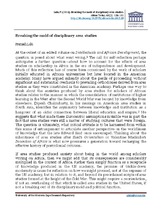| dc.contributor.author | Lalu, Premesh | |
| dc.date.accessioned | 2018-06-11T13:32:38Z | |
| dc.date.available | 2018-06-11T13:32:38Z | |
| dc.date.issued | 2016 | |
| dc.identifier.citation | Lalu, P. (2016). Breaking the mold of disciplinary area studies. Africa Today, 63(2): 126-131 | en_US |
| dc.identifier.issn | 0001-9887 | |
| dc.identifier.uri | http://dx.doi.org/10.2979/africatoday.63.2.18 | |
| dc.identifier.uri | http://hdl.handle.net/10566/3799 | |
| dc.description.abstract | At the outset of an edited volume on Intellectuals and African Development, the question is posed about what went wrong.1 The call for self-reflection perhaps anticipates a further question—about how to account for the effects of area studies on scholarship in Africa in the era of independence and development. Much of this reflection has of course been occasioned by the work of scholars initially educated in African universities but later located in the American academy. Many have argued saliently about the perils of proceeding without significant and substantial overhauls to prevailing orthodoxies derived from area studies as they were constituted in the American academy. Perhaps one way to think about the anxieties produced by area studies for scholars of African studies relates to the manner in which the consolidation of institutions of higher learning in the West after the Second World War was buoyed by knowledge from elsewhere. Dipesh Chakrabarty, in his musings on American area studies in South Asia, identifies the asymmetry between knowledge and institution as a hangover of an older connection between liberal education and empire.2 He suggests that what made these Eurocentric assumptions invisible was in part the fact that area studies were still a matter of studying cultures that were foreign. The question is ultimately, what critical attitude is to be harnessed from within this scene of estrangement to articulate another perspective on the worldliness of knowledge that the late Edward Said once encouraged. Thinking about the inheritance of area studies after Said’s Orientalism or Valentine Mudimbe’s Invention of Africa is what now pressures a generation toward recharging the effective history of postcolonial criticism. | en_US |
| dc.language.iso | en | en_US |
| dc.publisher | Indiana University Press | en_US |
| dc.rights | This is the author-version of the article published online at: http://dx.doi.org/10.2979/africatoday.63.2.18 | |
| dc.subject | Scholarship | en_US |
| dc.subject | Africa | en_US |
| dc.subject | African universities | en_US |
| dc.title | Breaking the mold of disciplinary area studies | en_US |
| dc.type | Article | en_US |
| dc.privacy.showsubmitter | FALSE | |
| dc.status.ispeerreviewed | TRUE | |

